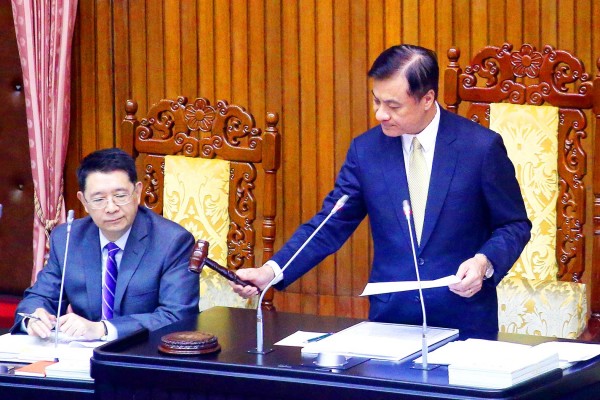《TAIPEI TIMES 焦點》 Legislature amends Criminal Code over overseas fraudsters

Legislative Speaker Su Jia-chyuan yesterday bangs his gavel to mark the passage of an amendment to Article 5 of the Criminal Code that adds aggravated fraud to a list of offenses committed abroad that can be prosecuted in Taiwan. Photo: CNA
/ Staff writer, with CNA
Taiwanese who commit aggravated fraud overseas are now to be subject to punishment in Taiwan after the Legislative Yuan passed an amendment to the Criminal Code yesterday.
The amendment to Article 5 of the Criminal Code added “aggravated fraud” to the list of offenses committed “outside the territories of the Republic of China” to which the Criminal Code will apply, making it easier to prosecute suspects in Taiwan.
The revision is to take effect when it is promulgated by the president, a formality that usually takes about two weeks.
Under existing law, aggravated fraud is not among the offenses listed under Article 5, making it nearly impossible for authorities to prosecute alleged fraudsters after they return to Taiwan.
In some cases, offenses committed overseas, but not listed in Article 5, may still be covered by the Criminal Code, but only if they are punishable by at least three years in jail.
As people guilty of fraud in Taiwan face jail sentences of between one and seven years and fines of up to NT$1 million (US$31,378), many cases do not meet the three-year threshold.
These legal loopholes have often forced prosecutors to drop cases against citizens suspected of committing fraud overseas.
Chinese Nationalist Party (KMT) Legislator Hsu Shu-hua (許淑華), who proposed the amendment, said a spate of recent cross-border telecom fraud cases involving Taiwanese called attention to the nation’s lenient treatment of its citizens committing fraud overseas and the possibility that it encouraged more criminal activity.
These cross-border fraud cases have tarnished the image of Taiwan’s judicial system and given the impression that “Taiwan is unwilling to harshly crack down on fraud and condones the perpetrators’ actions,” or that “Taiwan is a haven for fraudsters,” she said.
Hsu supported Taiwan’s judicial authorities having jurisdiction over Taiwanese who commit fraud overseas, which she said would live up to the expectations of the public and improve the image of the nation’s judiciary.
Dozens of Taiwanese have been arrested in countries such as Kenya, Malaysia and Indonesia over the past year for suspected involvement in fraud rings that were scamming people in China.
China then pushed, successfully in most cases, to have Taiwanese sent to China for prosecution rather than to Taiwan, arguing that it had jurisdiction over the cases because the victims were in China and Taiwan would not punish the suspects.
新聞來源:TAIPEI TIMES



















